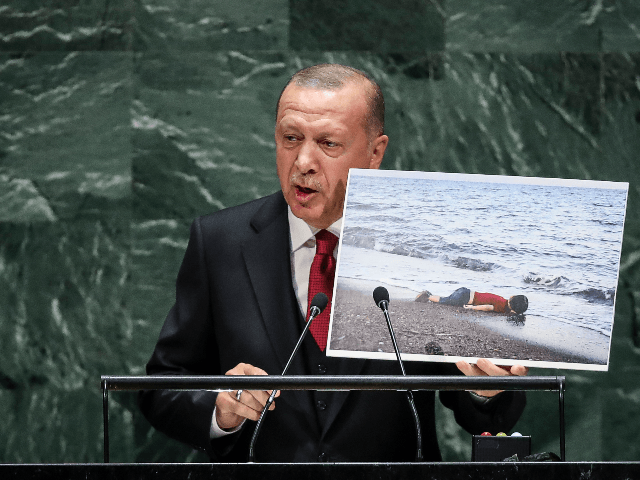A Turkish court on Saturday sentenced three human traffickers to 125 years in prison each for their roles in the death of Alan Kurdi, a two-year-old Syrian migrant child who drowned in September 2015.
Photos of Kurdi’s body washed ashore on a Turkish beach became a global media sensation and were aggressively used to break down Europe’s resistance to taking in large numbers of refugees and economic migrants.
The three defendants, unnamed by Turkish media but described as “organizers” of the human trafficking ring that attempted to smuggle Kurdi and his family into Greece, decided to go on the run during their trial. They were captured by Turkish security in the southern province of Adana and brought back to the High Criminal Court in Bodrum, where the beach Kurdi’s body was recovered from is located. The court convicted and sentenced them for “killing with eventual intent.”
A total of 14 people drowned when the overloaded smuggling boat carrying Alan Kurdi sank in 2015, including Alan’s mother Rehen and his five-year-old brother Galip. His father Abdullah, the only survivor of the family, took the remains of the others back to Syria to be buried.
Abdullah remained in Syria after that; according to one of his relatives, he saw no reason to go to Europe after the deaths of his children and wanted to remain “next to them.” The Kurdi family hails from the Kurdish city of Kobani in Syria, the scene of some of the most intense fighting in the war against the Islamic State.
Abdullah’s role in the death of his wife and sons has been intensely criticized over the years, including rumors the family denounced as slanderous that he was one of the organizers of the human smuggling ring. He was also accused of helping the smugglers by recruiting other people for the ill-fated voyage. He conceded early on that he was at the controls of the boat when it capsized, but said he had no choice but to take the rudder when the captain jumped overboard in high seas.
“I was holding my wife’s hand. My children slipped away from my hands. We tried to hold on to the boat. Everyone was screaming in pitch darkness,” he testified later.
In 2016 he was tried in absentia by a Turkish court along with two Syrian nationals involved in the smuggling ring. The other defendants both claimed Abdullah was the ringleader of the operation. The charges against Abdullah were dropped for unspecified reasons. The two Syrian men were convicted and sentenced to four years in prison.
In September 2019, Abdullah told an Italian newspaper he has moved to Erbil in Iraqi Kurdistan and hopes to join the crew of a German migrant rescue ship named Alan Kurdi in honor of his son, once his new wife gives birth to his new son.
Alan Kurdi, whose name has also been reported as Aylan Kurdi or Alan Shenu by various sources over the years, became the most famous of the many people killed during the mass migration waves emanating from the Middle East over the past decade. The family has stated “Alan” is the correct spelling of his first name, while “Aylan” is the Turkish spelling that gained wide currency in 2015 after Turkish media reported his death.
In a characteristic article from the time, the UK Guardian said the image of Kurdi’s lifeless body “encapsulated the extraordinary risks refugees are taking to reach the West” and captured the “full horror of the human tragedy unfolding on the shores of Europe.” Humanitarian activists were quoted saying Kurdi’s death proved Europe had to do more to take in refugees.
Critics of these policies warned that encouraging more migration would result in more deaths. Indeed, migrant deaths in the Mediterranean are still a fairly regular occurrence, including children, but there is no longer sensational media coverage of those terrible events.
Another child drowned on March 2 when a dinghy packed with migrants capsized while trying to reach Greece from Turkey, much the way Alan Kurdi died. A drowned eight-year-old girl washed up on another Turkish beach on the day the trial of Abdullah Kurdi and the two Syrian nationals began in 2016. NPR reported in January that 2,262 migrants died trying to reach Europe in 2018, down from over 3,000 deaths in 2017, but still higher than “pre-2014 levels.”
The extended Kurdi family said in June 2019 that it was “heartbroken” by the production of a Turkish movie called Alan Baby (Sea of Death) loosely based on the tragedy – “loosely based” in this case meaning “starring Steven Seagal.”
Alan’s aunt Tima Kurdi, who now lives in Canada – the ultimate destination of Abdullah Kurdi when his family drowned – wrote a more serious book about his death titled The Boy on the Beach: My Family’s Escape from Syria and Our Hope for a New Home.
“People opened their hearts when they saw the suffering in that image. It made them think, what if this happens to you, if you lose everything, your home, your country, you have no safe place, no food, no money and what will you do? It has become a permanent reminder for people to help others, that we all need each other and that we are all one,” she said of the infamous photo of Alan’s body on the beach during an August 2018 interview with NPR.
According to Tima, most of the Kurdi family made it out of Syria over the years and now lives in Turkey, Germany, and Canada, with the notable exception of her father, who is still in Syria. She said Abdullah Kurdi moved to Erbil in Iraq because he was given asylum there.

COMMENTS
Please let us know if you're having issues with commenting.